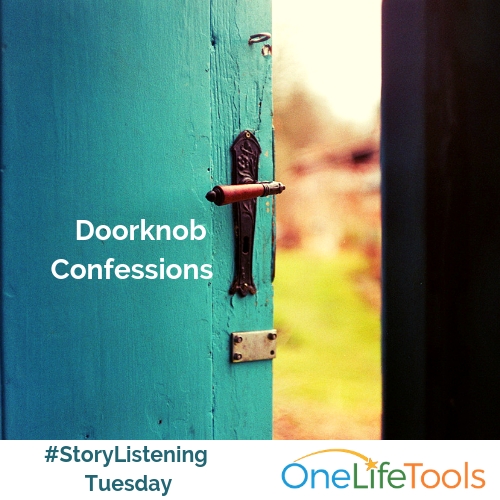How do you create a safe container for your new clients?
We’ve all been there. You have a great first meeting. Things seem to flow and you feel like you’re on the same page. You wrap up and make a plan for next steps. Then, at the door, hand on the handle or the logoff button, they drop a bomb that blows everything up.
In our Community of Practice today, we talked about these doorknob confessions. Here at OneLifeTools, a key part of our narrative training focuses on that very first meeting. There are step-by-step things you can say and do to create non-judgmental space for clients to share the things they’ve been thinking about.
Why is this so important?
Why do we want to get these confessions front and centre, as soon as possible?
#1 Judgement
First, because people often judge their own dreams and possibilities without even voicing them aloud. They may have shared something with friends or family and received a lackluster reaction. They may have already talked themselves out of their best opportunity. I wrote about permission here, and its role in our work.
Letting someone know: "I won’t judge you, and for a few minutes, let’s not judge anything. Let’s just get it all out on the table."
This creates freedom in a conversation that can evoke deep desires. People also feel heard, validated and seen.
#2 Knowledge
Second, because we don’t know what we don’t know. People dismiss possibilities because they don’t know how to start. There are countless occupation titles listed in O-Net Online and the Canadian Job Bank. Most of us only have a little knowledge about a handful of jobs.
Letting someone know: "it’s ok to be interested in something that’s completely outside your wheelhouse. Even career professionals don’t know every detail about every industry. We do know where to look, and we can help you look too."
This shows that it’s normal to not know everything about a particular path.
#3 Commitment
Third, because even the most confident, go-getter types sometimes hesitate to explore a possibility because they feel like it’s a choice, not an experiment.
People confuse curiosity with commitment.
Letting someone know: "investing a bit of time and energy to try something and to learn more about it doesn’t mean it’s set in stone as the next step."
This is a simple, important distinction.
#4 Hope
Finally, creating safe space - as soon as we can - is important because happier clients are much more likely to seek out and secure meaningful work.
Based on our outcome studies, we know that clients leave narrative sessions with increased hope and optimism. This is, in part, because we help them generate possibilities that are tied to their stories about their lived experience. They come in with overwhelm and apathy. They leave with opportunities and ideas that feel tangible and personal.
Letting someone know: "wanting meaningful work, being happy in our careers, this is possible for you."
This can make all the difference.
What happens on your doorstep?
What do you say and do to create safe space in a first session? How do you avoid doorknob confessions? How do you handle them when they do come up? I’d love to know!
If you're curious about our narrative approach, join us for our next free, live webinar or reach out to us for a chat.


1 comment
Mar 19, 2019 • Posted by Brad Whitehorn
I think creating a physically safe space is just as important as anything else. Job loss is a trauma no matter how you look at it, and having a trauma informed space for clients to come into will make it easier for them to open up.
Leave a comment: